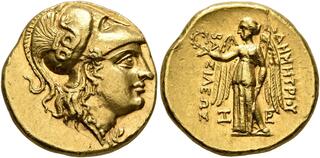| Leu Numismatik AG > Auction 15 | Auction date: 1 June 2024 |
| Lot number: 60 Price realized: This lot is for sale in an upcoming auction - Bid on this lot  | Show similar lots on CoinArchives Find similar lots in upcoming auctions on |
| Lot description: KINGS OF MACEDON. Demetrios I Poliorketes, 306-283 BC. Stater (Gold, 18 mm, 8.64 g, 5 h), in the types of Alexander III. Amphipolis, circa 294-293. Head of Athena to right, wearing Corinthian helmet decorated with a double coiled serpent. Rev. ΔHMHTPIOY - BAΣIΛΕΩΣ Nike standing front, head to left, with her wings spread, holding laurel wreath in her right hand and stylis in her left; to lower left, Z; to lower right, monogram. HGC 3, 1006d. Newell -, cf. 93 (unlisted combination of dies S/cc). Extremely rare and among the finest known examples. Beautifully struck and with a fine head of Athena. A few very light scratches and edge marks, otherwise, extremely fine. Ex Elsen 51, 13 September 1997, 168. Demetrios I Poliorketes stands as perhaps the most tragic figure among the Diadochi. As the son of Antigonos I Monophthalmos, he bore witness to his father's ascension to become the most powerful ruler of his time, serving him as a general in numerous major engagements among Alexander's surviving companions. Demetrios achieved his most notable triumph in the naval Battle of Salamis in 306 BC, where he soundly defeated Ptolemy I - a monumental victory that led to his father assuming the royal title. This move spurred Antigonos' adversaries to follow suit, and by the close of 305 BC, there were now four Macedonian kings: Antigonos, Ptolemy, Lysimachos, and Seleukos. In the years 305-304 BC, Demetrios oversaw the famous siege of Rhodes, earning him the epithet Poliorketes ('the Besieger'), though he ultimately failed to conquer the city. The defeat at the Battle of Ipsos in 301 BC dealt a decisive blow to the Antigonid aspirations of ruling the entirety of Alexander's vast empire. Antigonos himself met his end in the debacle, while his son, known for his notorious impetuosity which had greatly contributed to the defeat, narrowly escaped to Ephesos. Despite being outmatched on land, Demetrios asserted naval dominance for several years with his formidable fleet of 300 warships, securing control over many strategic harbor cities and briefly reclaiming Macedon in the late 290s BC. However, his recklessness led to his downfall when he invaded Asia Minor in 287 BC. Pursued by Agathokles, the son of Lysimachos, and Seleukos, Demetrios' forces dwindled rapidly, leading to his surrender to the latter in the early spring of 286 BC. Seleukos accorded the defeated former king, who happened to be his former father-in-law and his son's present father-in-law through Seleukos' marriage to Stratonike, with profound respect. He provided him with his own court and funded his extravagant lifestyle. In confinement, Demetrios, once known for his vigor and energy, succumbed to a life of indulgence and excess. He passed away three years later, at the age of 54, at the culmination of a life marked by rapid ascent and tragic downfall - a remarkable general and esteemed king, whose spectacular rise and fall stirred the emotions and aspirations of contemporaries and posterity alike. Estimate: 10000 CHF |  |



